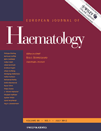
EUROPEAN JOURNAL OF HAEMATOLOGY
Scope & Guideline
Advancing Hematology Research for a Healthier Tomorrow
Introduction
Aims and Scopes
- Hematological Malignancies:
The journal covers a wide range of hematological malignancies, including acute myeloid leukemia, chronic lymphocytic leukemia, and multiple myeloma, focusing on innovative treatment strategies, clinical outcomes, and prognostic factors. - Transplantation and Cellular Therapies:
Research related to hematopoietic stem cell transplantation, including conditioning regimens, graft-versus-host disease, and CAR-T cell therapies, is a core area of interest, highlighting advancements and challenges in these fields. - Clinical Trials and Real-World Evidence:
The journal emphasizes the importance of clinical trials and real-world studies, exploring the efficacy and safety of new therapies, treatment patterns, and patient-reported outcomes in hematological diseases. - Genetic and Molecular Insights:
Studies investigating the genetic and molecular underpinnings of hematological disorders are featured, contributing to the understanding of disease mechanisms and the development of targeted therapies. - Quality of Life and Patient-Centered Care:
Research addressing health-related quality of life, psychosocial aspects of treatment, and patient-centered approaches in hematology is also a significant focus, reflecting the holistic view of patient care.
Trending and Emerging
- Immunotherapy and Targeted Treatments:
There is a notable increase in research related to immunotherapy, including CAR-T cell therapy and immune checkpoint inhibitors, highlighting their efficacy and safety in treating various hematological malignancies. - Real-World Evidence and Comparative Effectiveness:
Emerging studies focus on real-world evidence and comparative effectiveness research, assessing treatment outcomes in diverse patient populations and informing clinical decision-making. - Genomic and Biomarker Studies:
Research investigating genomic alterations and biomarkers for prognostication and treatment response is on the rise, reflecting a trend towards personalized medicine in hematology. - Quality of Life and Supportive Care Interventions:
An increasing emphasis on quality of life assessments, psychosocial interventions, and supportive care strategies for patients with hematological disorders indicates a broader focus on holistic patient care. - COVID-19 Impact on Hematology Patients:
The impact of COVID-19 on patients with hematological conditions has become a significant area of research, exploring infection rates, treatment adaptations, and outcomes in this vulnerable population.
Declining or Waning
- Traditional Chemotherapy Approaches:
Research focusing on traditional chemotherapy regimens for hematological malignancies appears to be declining, as newer, more targeted therapies and immunotherapies gain prominence in clinical practice. - Basic Laboratory Techniques:
Papers centered on basic laboratory techniques in hematology, such as routine blood tests and traditional cytogenetic analyses, have decreased as the field moves toward more advanced molecular diagnostics and personalized medicine. - Epidemiological Studies without Novel Insights:
Epidemiological studies that do not provide novel insights or advancements in understanding disease burden or treatment outcomes are becoming less frequent, as the focus shifts to studies with actionable results.
Similar Journals

Blood and Lymphatic Cancer-Targets and Therapy
Uncovering Innovative Therapies for Cancer CareBlood and Lymphatic Cancer-Targets and Therapy, published by DOVE MEDICAL PRESS LTD, is a vital open-access journal that has been disseminating crucial research and findings in the field of hematology and oncology since 2011. With its ISSN 1179-9889, this journal focuses on the latest therapeutic targets and innovative treatment strategies for blood and lymphatic cancers, contributing significantly to the advancement of knowledge and practice in this specialized area. Designed for researchers, healthcare professionals, and students alike, Blood and Lymphatic Cancer-Targets and Therapy aims to foster a deeper understanding of cancer biology and promote collaborative efforts leading to novel therapeutic interventions. The open-access model ensures that research findings are readily accessible to a global audience, underscoring the journal's commitment to enhancing patient care and fostering educational growth in the cancer domain.
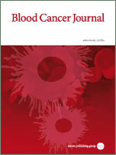
Blood Cancer Journal
Advancing knowledge in blood cancer research.Blood Cancer Journal, published by SPRINGERNATURE, is a leading open-access journal that has been at the forefront of hematology and oncology research since its inception in 2011. With an impressive impact factor and a commitment to disseminating high-quality research, it holds a prestigious Q1 ranking in both hematology and oncology categories as of 2023. The journal is dedicated to publishing innovative studies, comprehensive reviews, and insightful commentaries that advance our understanding of blood cancers, making it an essential resource for researchers, healthcare professionals, and students in the field. Its open-access model ensures that groundbreaking research is accessible to a global audience, promoting collaborative efforts to enhance treatment methodologies and patient outcomes. With a strong reputation illustrated by its Scopus rankings—8th in hematology and 30th in oncology—Blood Cancer Journal exemplifies excellence and leadership in the ever-evolving landscape of cancer research.
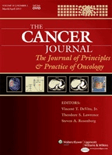
CANCER JOURNAL
Innovating Oncology: Where Research Meets Impact.CANCER JOURNAL is a leading peer-reviewed publication dedicated to the dissemination of innovative research in the fields of cancer research and oncology. Published by Lippincott Williams & Wilkins, this journal serves as an essential resource for researchers, clinicians, and students seeking to advance their understanding of cancer mechanisms, treatment strategies, and patient care. With an ISSN of 1528-9117 and an E-ISSN of 1540-336X, it boasts a respectable 2023 Q2 category ranking in both Cancer Research and Oncology, reflecting its impactful contributions to the scientific community. Although it currently does not offer open access, the journal's rigorous peer-review process ensures the publication of high-quality, relevant studies that stimulate further investigation and collaboration among professionals. Since its inception, the journal has evolved through several converged years, maintaining a steadfast commitment to addressing the complexities of cancer biology and treatment. At its core, CANCER JOURNAL aims to foster advancements in oncology, making it a vital platform for sharing pivotal findings that could transform cancer research and therapeutic practices.
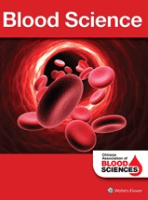
Blood Science
Transforming Understanding of Blood-Related Health IssuesBlood Science is a distinguished peer-reviewed journal published by Lippincott Williams & Wilkins, focusing on the dynamic field of hematology. Since its inception, the journal has aimed to disseminate high-quality research and innovative findings that contribute to our understanding of blood-related health issues. With the ISSN 2543-6368, it offers a platform for academic discussions and breakthroughs in various subfields including hematopathology, blood disorders, and transfusion medicine. As of 2023, Blood Science is ranked in the third quartile (Q3) within the hematology category, indicating a burgeoning influence among its peers, with a Scopus rank of #101 out of 137 journals, placing it in the 26th percentile. Although it is not an open-access journal, it provides essential insights and valuable data for researchers, healthcare professionals, and students alike, enhancing the collective knowledge and practices in hematology. With a publication period spanning from 2019 to 2024, Blood Science remains committed to fostering the advancement of blood science research and enhancing patient care methodologies.

Experimental Hematology & Oncology
Advancing the Frontiers of Blood and Cancer ResearchExperimental Hematology & Oncology is a premier journal published by BMC, dedicated to advancing knowledge in the fields of hematology, oncology, and cancer research. Since its inception in 2012, this Open Access journal has emerged as a vital resource for researchers and healthcare professionals, fostering the dissemination of high-quality research that enhances our understanding of blood disorders and malignancies. With impressive rankings in Quarters 1 of key categories including Cancer Research, Hematology, and Oncology, it holds significant prestige, evidenced by its Scopus rankings: #42/404 in Medicine (Oncology) and #17/137 in Medicine (Hematology). The journal aims to publish cutting-edge studies, reviews, and perspectives that contribute to the evolution of therapeutic strategies and innovative treatment modalities. Researchers and practitioners alike will find this journal indispensable for staying at the forefront of breakthroughs in hematological and oncological research.
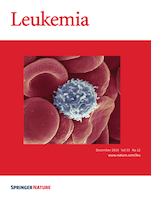
LEUKEMIA
Advancing the Frontiers of Hematology and OncologyLEUKEMIA, published by SpringerNature, is a premier journal in the field of hematology and oncology, with ISSN 0887-6924 and E-ISSN 1476-5551. Established in 1987, this esteemed publication serves as a critical platform for disseminating groundbreaking research and comprehensive reviews on the pathophysiology, diagnosis, and treatment of leukemia and related hematological disorders. With a distinguished impact, it holds a top-tier status in several categories, including Q1 rankings in Anesthesiology and Pain Medicine, Cancer Research, Hematology, and Oncology for 2023. The journal is globally recognized for its rigorous peer-review process and is highly regarded among academia, evidenced by its impressive Scopus rankings—7th in Hematology and 24th in Oncology. Researchers, clinicians, and students alike will benefit from the rich content that this journal offers, making it an invaluable resource in the fight against leukemia. The main objective of LEUKEMIA is to advance knowledge and encourage further innovations within the field, ensuring that vital insights reach practitioners and researchers around the world.
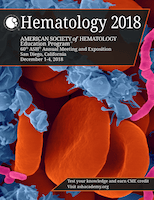
Hematology-American Society of Hematology Education Program
Exploring Innovations in Hematological ScienceHematology-American Society of Hematology Education Program is a premier peer-reviewed journal dedicated to advancing the field of hematology through comprehensive educational content. Published by the American Society of Hematology, this journal plays a crucial role in disseminating knowledge to researchers, clinicians, and students in hematology and related disciplines. With an impressive Q1 status in the field, it ranks among the top journals at the forefront of hematological research, as evidenced by its 60th percentile ranking in Scopus' Medicine - Hematology category. Although it does not offer open access, the journal provides invaluable insights and educational resources from leading experts, focusing on the latest advancements, treatment protocols, and evolving understanding of blood disorders. Covering a wide range of topics, from basic research to clinical applications, this journal is essential for anyone seeking to deepen their expertise and stay informed on the latest developments in hematology. For further engagement, readers can access insightful articles published since 2001, ensuring a rich repository of knowledge for ongoing research and clinical excellence.
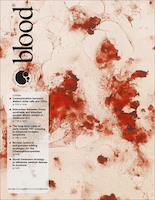
BLOOD
Advancing the Science of Hematology.BLOOD, published by the American Society of Hematology, is a premier peer-reviewed journal in the fields of Biochemistry, Cell Biology, Hematology, and Immunology. With an impressive impact factor and ranking in the top quartiles (Q1) across multiple disciplines, BLOOD is essential reading for researchers and professionals seeking to stay updated on the latest advancements in hematology and related fields. The journal has been a cornerstone of hematological research since its inception in 1946, providing a platform for rigorous scientific inquiry and discourse. Its commitment to publishing high-quality original research, comprehensive reviews, and insightful editorials makes it a vital resource for students, practitioners, and scientists alike. By offering exceptional access to influential publications, BLOOD continues to shape the future of hematology and enhance understanding of blood-related disorders, marking its vital role in advancing both basic and clinical research.
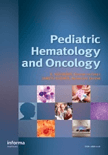
PEDIATRIC HEMATOLOGY AND ONCOLOGY
Empowering healthcare through cutting-edge pediatric studies.Pediatric Hematology and Oncology, published by Taylor & Francis Inc, serves as a vital platform dedicated to the fields of hematology, oncology, and pediatrics, providing a comprehensive avenue for the dissemination of scholarly research and clinical advancements. With an ISSN of 0888-0018 and an E-ISSN of 1521-0669, this journal has successfully converged its expertise over the years from 1984 to 2024. Ranked in the Q3 category for Hematology and Oncology, alongside a Q2 ranking in Pediatrics, Perinatology, and Child Health (2023), it engages a diverse readership comprising researchers, healthcare professionals, and students eager to explore groundbreaking studies in child health and treatment methodologies. While it currently does not offer Open Access options, the journal is widely cited and recognized, particularly in its specialized fields, fostering a rich environment for dialogue and innovation in the management of pediatric hematological and oncological disorders. The journal is based in the United Kingdom at 530 Walnut Street, Ste 850, Philadelphia, PA 19106, making it an essential resource for those pursuing excellence in pediatric medical research.

Hematologie
Exploring Innovations in HematologyHematologie is a highly regarded journal in the field of hematology, published by JOHN LIBBEY EUROTEXT LTD. With an ISSN of 1264-7527 and an E-ISSN of 1950-6368, this journal has established itself as a vital resource for researchers, clinicians, and students dedicated to advancing the understanding of blood disorders and treatments. Although the journal's coverage in Scopus was discontinued in 2018, it has continually provided invaluable insights and research findings. The journal aims to foster knowledge sharing and discussion in hematology, exploring innovative methodologies and emerging trends in the field. With a commitment to quality research, Hematologie remains an essential platform for disseminating critical findings that can drive clinical practice and influence future studies in hematological sciences.